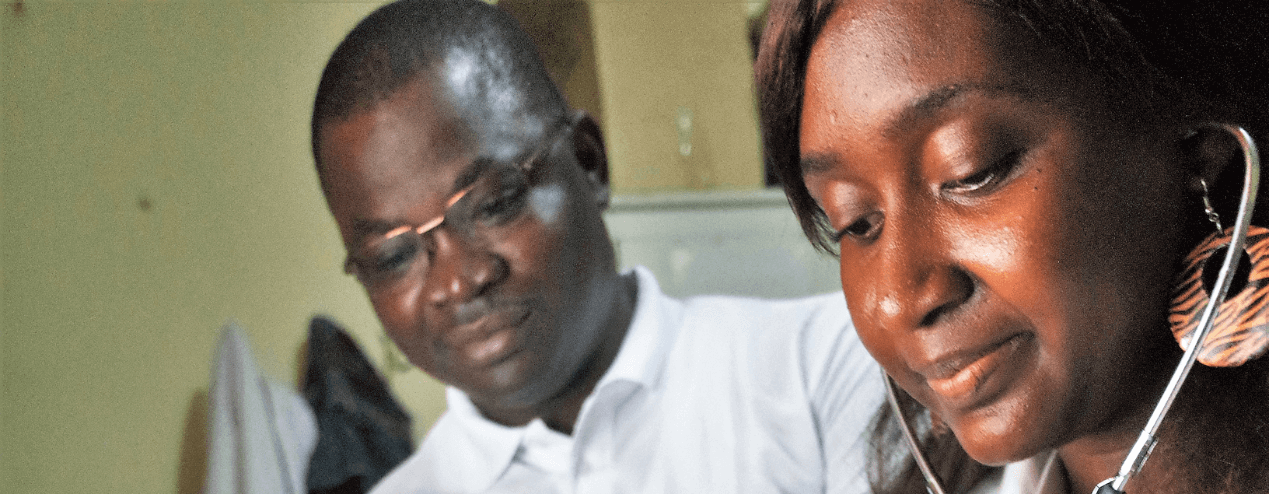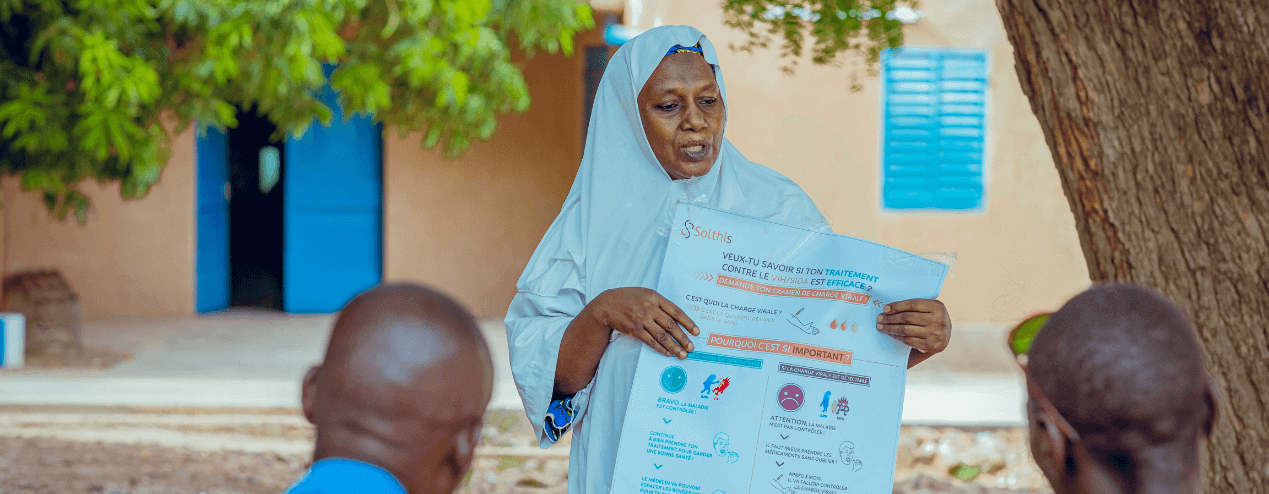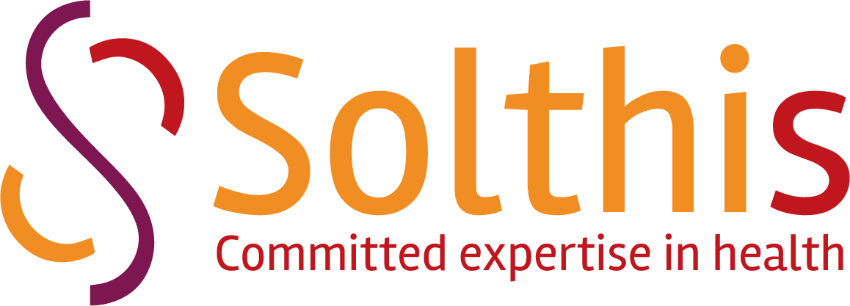PRINCIPLES OF ACTION 1
ACTING WITHOUT SUBSTITUTING
In keeping with the non-substitution approach, we focus our efforts on supporting local organisations and stakeholders by developing their skills and the way they operate, in order to promote their autonomy and the sustainability of our interventions.
PRINCIPLES OF ACTION 2
AS LOCAL AS POSSIBLE
As international as necessary, we align our work with national strategies and policies and support our partners based on the needs they raise.
Our action framework
Solthis leverages the expertise of its teams and a partnership-based approach to develop impactful projects. These projects provide integrated and sustainable solutions that align with the needs of the populations and are developed in collaboration with all the stakeholders concerned. Our intervention framework is centered around three key areas: a multiplier impact approach, a partnership approach at the centre of projects and a health promotion approach to strengthen health systems and community health.

SCALING IMPACT
Our approach relies on three modes of intervention: capacity building and empowerment, operational research, and advocacy. This approach supports the transition to national partners and ensures the sustainability of our interventions. When appropriate, this approach also facilitates scale-up at the national level or within broader international health policies.
Our interventions are integrated into existing health systems and community actions from the start. Through knowledge production, capacity building, and advocacy, we create the conditions necessary for transitioning or scaling up our interventions. This is achieved by integrating them into national strategies and policies, enabling expansion beyond the project’s initial scope, both in terms of the time period (sustainability) and space (geographical reach), to maximize impact on target populations.
This approach allows us to uphold our principle of ‘non-substitution’ in all of our work.
→PARTNERSHIPS AT THE CENTRE OF PROJECTS
Solthis relies on the legitimate voices of national and local actors to define and implement national health strategies. Our strategy is developed in close partnerships with various national institutions, academic partners, research institutes, health facilities, and health personnel.
In line with the localization of aid and the principle of ‘as local as possible, as international as necessary,’* we aim to enhance the role of actors closest to the action. We do this by taking a non-substitution approach, aligning our efforts with national strategies and policies, and supporting our partners based on the needs they raise.
Our partnership approach with civil society organizations (CSOs) has been strengthened in recent years. We aim to support CSOs with organizational development, from enhancing technical expertise to securing direct funding. This includes building capacity in operational research, monitoring and evaluation, and administrative and financial management.
Additionally, our partnership approach seeks to forge more advocacy alliances with organizational and research partners, both at the country level and globally.
* Istanbul Humanitarian Summit, UNSG 2016.
→HEALTH PROMOTION
Solthis’ intervention strategy aims to promote equitable access to healthcare for all. We achieve this through greater citizen involvement and mechanisms that enhance the accountability of the healthcare system to its users. Our efforts span multiple levels: individual, community, healthcare system and service level, including creating enabling environments.
Our approach to health promotion is participatory and inclusive. It is based on the needs identified by populations and health actors, considering health determinants to reduce inequalities. This approach enables us to continue strengthening the capacities of both public and community-based health systems and services. We leverage our expertise to address key determinants such as gender, empowerment, and psychosocial aspects.
→OUR METHODS OF INTERVENTION
Our interventions are thoughtfully designed from the outset to integrate into health systems and community actions. This process involves a detailed analysis of priority needs and ensures that our efforts complement existing initiatives. Our approach is supported by national actors, including institutions, health services, and communities.
By focusing on partnerships with front-line actors, we foster better ownership and sustainability of our interventions.

CAPACITY BUILDING AND EMPOWERMENT
A partnership approach that strengthens the capacity of national actors to take action, taking a non-substitution approach.
In line with the non-substitution approach, Solthis’s work is based on supporting local facilities and actors, developing their skills and their operations, in order to promote their autonomy and the sustainability of interventions.
3 levels of capacity building:
- Individual (patients and users; healthcare workers; community actors and civil society; institutional actors and managers)
- Organisational (infrastructure and equipment)
- National (political and institutional).
4 types of support:
- Strengthening skills and individual empowerment
- Organizational guidance and capacity building
- Material support
- Expert guidance for decision-makers, support in advocacy and technical assistances.
OPERATIONAL RESEARCH
An approach based on the production of knowledge to improve interventions:
- We produce a continuum of knowledge based on field experience, ranging from the use of Monitoring, Evaluation, Accountability and Learning (MEAL) data and evidence-based data, to scientific data from our projects.
- Our research work is supported by international academic partnerships in the countries where we operate and with the support of our Scientific Committee.
- We take a multidisciplinary (epidemiological, medical, sociological, anthropological, economic, political) and participatory approach to strengthen knowledge sharing and we co-create interventions with all the stakholders concerned (academics, politicians, the population) in order to improve the quality of our interventions.
- Learning and sharing based on the data and results of our projects promotes informed decision-making by institutions and target populations. This is achieved through knowledge transfer and exchange. Additionally, it facilitates communication about our work by sharing it with the scientific community.
ADVOCACY FOR UNIVERSAL ACCESS TO HEALTHCARE
We influence and engage decision-makers at local, national, and international levels:
- Our advocacy work is grounded in our technical expertise and operational experience, as well as our understanding of the challenges faced by the countries where we work. It is evidence-based, drawing on our knowledge production and operational research results. This approach enables us to develop compelling arguments for changes in health policies.
Our advocacy is twofold:
- At project level: to enable the integration of effective interventions into public policies and to carry out advocacy interventions with our partners to promote users’ right to health;
- At a global level: to participate in the promotion of relevant approaches to health and international solidarity issues (right to health, equitable access to quality health services, global health financing and governance mechanisms).
0
PROJECTS AND TECHNICAL ASSISTANCES IN 14 COUNTRIES IN 2024
0
Healthcare professionals trained
0
People who have accessed health consultations and services
0
People who have been sensitized and trained on SRHR issues




